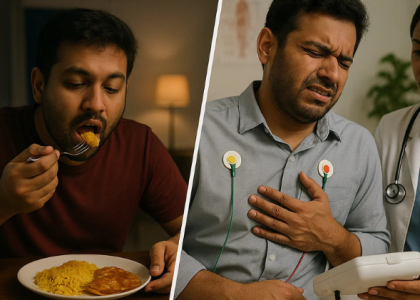Pregnancy is a joyful time filled with excitement and love. You are growing a new life inside you, and your family is celebrating this blessing. But pregnancy is also a time when your heart works extra hard to support both you and your baby.
Many South Asian women don’t know that pregnancy can affect their heart health in important ways. Heart problems during pregnancy are rising, especially among women from India, Pakistan, Bangladesh, and Sri Lanka. The good news is that knowing about these risks can help you protect yourself and your baby.
Your heart deserves care during this special time. Let’s learn how to keep it healthy.
Why Pregnancy Affects the Heart
During pregnancy, your body goes through amazing changes. Your heart has to work much harder than normal. Here’s what happens:
Your blood volume increases. Your body makes about 50% more blood to feed your growing baby. This means your heart has to pump much more blood every minute.
Your heart beats faster. Your heart rate goes up by 10-20 beats per minute. It’s like your heart is exercising all the time.
Your blood vessels change. They become more relaxed to help blood flow to your baby. But this can also cause your blood pressure to drop at first, then rise later in pregnancy.
Your body uses more oxygen. Both you and your baby need oxygen, so your heart and lungs work harder.
These changes are normal, but they can be challenging for women who already have heart problems or who develop them during pregnancy.
Hidden Risks for South Asian Women
South Asian women face extra challenges during pregnancy. Research shows that women from our communities have higher risks for certain pregnancy complications that can affect the heart:
Gestational diabetes happens when your blood sugar gets too high during pregnancy. South Asian women have the highest rates of gestational diabetes among all ethnic groups. Studies show that:
- Up to 36% of South Asian women develop gestational diabetes (compared to about 6% of other women)
- This happens because of genetic factors and how our bodies process insulin
- High blood sugar during pregnancy can strain your heart and blood vessels
High blood pressure can develop during pregnancy, even if you never had it before. This includes:
- Gestational hypertension (high blood pressure that starts after 20 weeks of pregnancy)
- Preeclampsia (high blood pressure with protein in urine or other organ problems)
Preeclampsia is especially dangerous. Research shows that Asian women may have the highest risk for heart complications from preeclampsia. This condition can cause:
- Damage to your heart muscle
- Problems with how your heart pumps blood
- Increased risk of heart disease later in life
These problems happen more often in South Asian women, even when we are younger and have normal weight compared to other women.
What Are the Warning Signs?
During pregnancy, it’s important to watch for signs that your heart might be struggling. Some symptoms are normal during pregnancy, but others need immediate attention.
Call your doctor right away if you have:
- Severe shortness of breath – especially when lying down or with light activity
- Chest pain or pressure – any chest discomfort that doesn’t go away
- Fast or irregular heartbeat – heart racing for no reason
- Severe swelling – sudden swelling in your face, hands, or feet
- Dizziness or fainting – feeling like you might pass out
- Severe headaches – headaches that won’t go away or are worse than usual
- Changes in vision – seeing spots, blurry vision, or loss of vision
- Upper belly pain – pain under your ribs, especially on the right side
Other warning signs include:
- Extreme tiredness that doesn’t get better with rest
- Trouble breathing when you lie flat
- Waking up at night unable to breathe
- Coughing up blood or frothy spit
Remember: These symptoms are not normal parts of pregnancy. Don’t wait or worry about “bothering” your doctor. Your health and your baby’s health are too important.
What to Ask Your Doctor
Many South Asian women feel shy about asking doctors questions. But pregnancy is the perfect time to speak up about your health. Here are important questions to ask at your prenatal visits:
About your heart risk:
- “Am I at higher risk for heart problems because I’m South Asian?”
- “Should I get any special heart tests during pregnancy?”
- “What should my blood pressure be during pregnancy?”
- “How often should my blood pressure be checked?”
About gestational diabetes:
- “Am I at risk for gestational diabetes?”
- “When will I be tested for diabetes?”
- “What can I do to prevent gestational diabetes?”
About preeclampsia:
- “What are the early signs of preeclampsia?”
- “Am I at higher risk for preeclampsia?”
- “What should I do if I get severe headaches or vision changes?”
About monitoring:
- “How often should I have checkups?”
- “What symptoms should make me call you right away?”
- “Should I monitor my blood pressure at home?”
Don’t be afraid to ask questions. Write them down before your appointment so you don’t forget. Your doctor wants to help you have a healthy pregnancy.
After Baby is Born
Many women think that once the baby is born, pregnancy-related health risks are over. But this is not true. Your heart health after pregnancy is very important.
The first few weeks after delivery are actually a high-risk time for heart problems. This is because:
- Your body is still adjusting to major changes
- Your blood volume is returning to normal
- Hormones are changing rapidly
- You may not be getting enough sleep or food
Long-term heart risks can develop years later. Women who had pregnancy complications have higher risks for:
- High blood pressure (2-4 times higher risk)
- Type 2 diabetes (8-10 times higher risk if you had gestational diabetes)
- Heart attacks and strokes (2-4 times higher risk)
- Heart failure (4 times higher risk if you had preeclampsia)
For South Asian women, these risks may be even higher. Studies show that:
- South Asian women with gestational diabetes have an 11-fold risk of developing type 2 diabetes later
- One-third of South Asian women with gestational diabetes develop diabetes within 8 years
- Heart disease often occurs 10 years earlier in South Asian women than in other groups
This is why follow-up care after pregnancy is so important. Don’t skip your postpartum appointments, even if you feel fine.
Cultural Connection
In many South Asian families, women are taught to put their family’s needs before their own. During pregnancy and after the baby is born, you might feel pressure to focus only on your baby’s health and ignore your own.
But here’s an important truth: taking care of your heart is taking care of your family. Your children need you to be healthy and strong for many years to come. Your family needs you to live a long, healthy life.
Some women worry that talking about heart problems or asking for medical tests means they are being weak or complaining too much. This is not true. Being aware of your health and seeking proper care is being smart and responsible.
Your heart health affects your ability to:
- Care for your children as they grow
- Be present for important family moments
- Support your family through life’s challenges
- Enjoy watching your grandchildren grow up
Taking care of yourself is not selfish – it’s necessary. Your family wants you to be healthy and happy.
Action Checklist
Here are simple steps you can take to protect your heart during and after pregnancy:
During pregnancy:
- Check your blood pressure regularly – Ask your doctor how often and consider a home monitor
- Attend all prenatal appointments – Don’t skip visits, even if you feel fine
- Eat heart-healthy foods – Focus on vegetables, fruits, whole grains, and lean proteins
- Limit salt and oil – Use herbs and spices instead of extra salt
- Stay active with doctor approval – Walking is usually safe and good for your heart
- Get enough rest – Your heart needs time to recover each day
- Take your vitamins – Prenatal vitamins support your heart and baby’s development
After pregnancy:
- If you had high blood pressure or diabetes in pregnancy, get heart tests later – Don’t assume the problems are gone
- Continue eating home-cooked food with less salt and oil – Keep up healthy habits
- Ask about follow-up appointments – Some women need special monitoring for months or years
- Know your numbers – Learn your blood pressure, blood sugar, and cholesterol levels
- Don’t ignore symptoms – Call your doctor if you feel chest pain, shortness of breath, or extreme tiredness
Long-term:
- Take time to rest – your heart needs it too! – Don’t feel guilty about resting
- Exercise regularly – Even 30 minutes of walking daily helps your heart
- Manage stress – Try meditation, prayer, or talking with family and friends
- Don’t smoke – If you smoke, ask for help to quit
Pregnancy is Powerful — So is Your Heart
Pregnancy shows how amazing and strong your body is. You are growing a human being inside you! But this incredible process also requires your heart to work harder than ever before.
Your heart has been with you through every moment of your life. It has supported you through joy and challenges. Now, during pregnancy and after, it’s time to support your heart in return.
Remember that seeking care for your heart health is not a sign of weakness – it’s a sign of wisdom. You deserve to have a healthy heart, not just for your baby, but for yourself and your entire family.
By taking care of your heart during pregnancy, you are giving your child the best gift possible: a healthy mother who will be there for them throughout their life.
Your pregnancy is powerful, and so is your heart. Let’s work together to keep it that way.
Citations:
- Boyer, T. et al. Association of Prepregnancy Cardiometabolic Factors With Gestational Diabetes Among Asian Populations in the United States. JACC: Asia. 2024;4(8):601-611. Link
- Lamri, A. et al. The genetic risk of gestational diabetes in South Asian women. eLife. 2022;11:e81498. Link
- Minhas, A. et al. Asian and Pacific Islander women may be at greatest risk for preeclampsia complications. American Heart Association News. January 24, 2023. Link
- Syed, M. et al. Causes and consequences of gestational diabetes in South Asians living in Canada: results from a prospective cohort study. Canadian Medical Association Journal Open. 2017;5(3):E604-E611. Link
- Brown, H.L. et al. Adverse Pregnancy Outcomes and Cardiovascular Disease Risk: Unique Opportunities for Cardiovascular Disease Prevention in Women. Circulation. 2021;143(18):e902-e920. Link




